Best Sanctions & Export Controls Lawyers in Randburg
Share your needs with us, get contacted by law firms.
Free. Takes 2 min.
List of the best lawyers in Randburg, South Africa
About Sanctions & Export Controls Law in Randburg, South Africa
Sanctions and export controls are a specialized area of law focused on the regulation of trade, the transfer of goods, technology, and services, and compliance with both domestic and international restrictions. In Randburg, South Africa, companies and individuals must navigate complex legal frameworks that restrict trade with certain countries, entities, or individuals, as well as control the export of specific goods and technologies. These rules are designed to support national security, honor international commitments, and prevent unlawful activities such as money laundering and terrorism financing. Non-compliance can result in severe penalties, including heavy fines, restrictions on business, and even criminal prosecution.
Why You May Need a Lawyer
Legal advice is often necessary in sanctions and export controls matters to help individuals and businesses understand and abide by relevant laws. Common scenarios where legal assistance is valuable include:
- Planning to export goods or technology from Randburg to foreign markets
- Dealing with cross-border transactions involving countries under sanctions
- Supplying products or services to international partners and needing to verify compliance
- Facing investigations, audits, or enforcement actions by authorities
- Acquiring businesses with international exposure
- Managing supply chains that include sensitive items or sanctioned parties
- Responding to unexpected queries or holds from customs or financial institutions
- Seeking to unblock assets that are frozen due to sanctions regulations
A lawyer can help interpret complex regulations, perform due diligence, advise on proper documentation, and represent you in official proceedings if necessary.
Local Laws Overview
South Africa has established legal frameworks to enforce sanctions and export controls, administered at both national and local levels. Key laws and regulations relevant to Randburg include:
- The National Conventional Arms Control Act which governs the export, import, and transit of conventional arms and related items
- The Non-Proliferation of Weapons of Mass Destruction Act which regulates goods and technologies that could be used for weapons proliferation
- Regulations from the Department of Trade, Industry and Competition (DTIC) covering dual-use items and sensitive technologies
- South African Reserve Bank (SARB) rules on foreign exchange, especially where trade involves sanctioned entities or jurisdictions
- Declarations and notices that give effect to United Nations Security Council sanctions and African Union embargoes
Businesses and individuals in Randburg must comply with these national and international obligations. South Africa does not maintain its own autonomous sanctions regime but enforces international sanctions through its legal system. Local enforcement is carried out in cooperation with customs, law enforcement, and banking authorities.
Frequently Asked Questions
What are sanctions and export controls?
Sanctions restrict trade and financial activities with specific countries, individuals, or entities to achieve national security or foreign policy goals. Export controls regulate the transfer of certain goods, technologies, or information from one country to another.
Which authorities oversee sanctions and export controls in South Africa?
The Department of Trade, Industry and Competition, the National Conventional Arms Control Committee, the Department of International Relations and Cooperation, the South African Reserve Bank, and the South African Police Service collaborate to administer and enforce these laws.
What happens if I accidentally violate a sanction or export control regulation?
Violations can lead to penalties including fines, imprisonment, or both. Inadvertent breaches can still attract enforcement action, though authorities may consider intent as a mitigating factor.
What types of goods are subject to export controls in South Africa?
Arms, ammunition, military and dual-use goods, certain chemicals, information technologies, and items with potential applications in weapons of mass destruction are most frequently subject to export controls.
Do I need a license to export goods from Randburg to another country?
Depending on the type of goods and the destination, you may need to apply for a license from the relevant authority, often the DTIC or the National Conventional Arms Control Committee.
How do I know if a country or entity is subject to South African sanctions?
South African authorities publish lists of countries, organizations, and persons subject to sanctions, based on UN Security Council and African Union decisions. Check official notices and consult with legal or compliance experts.
Are there restrictions on providing services, not just goods?
Yes, sanctions can also prohibit providing certain services, including financial services, technical assistance, and brokering, to sanctioned parties or countries.
How can a legal advisor assist with compliance?
A legal advisor can review your business activities, guide you through licensing and compliance requirements, provide training to staff, help set up compliance programs, and liaise with authorities.
What should I do if I receive funds or assets that may be connected to a sanctioned individual?
You should not process such transactions and must immediately report the situation to authorities and seek legal guidance to avoid inadvertent violations.
Are South African sanctions laws aligned with other countries or just United Nations mandates?
South Africa primarily applies sanctions in accordance with United Nations Security Council resolutions and African Union embargoes. Local regulations do not automatically cover autonomous sanctions by the United States, European Union, or other states.
Additional Resources
If you need further information or support regarding sanctions and export controls in Randburg, consider consulting the following:
- The Department of Trade, Industry and Competition (DTIC) for regulations on export licensing and controls
- The South African Reserve Bank for guidance on financial sanctions and foreign exchange rules
- The National Conventional Arms Control Committee (NCACC) for matters related to arms and military items
- The South African Revenue Service (SARS) Customs division for practical aspects of import and export procedures
- Legal aid organizations, specialist law firms, and business chambers with expertise in international trade law
- The official websites of United Nations and African Union for up to date lists of sanctions
Next Steps
If you suspect your business or personal activities may fall within the ambit of South Africa’s sanctions and export controls regulations, it is important to act quickly:
- Assess your products, technology, and markets to identify potential compliance issues
- Seek legal advice from a lawyer or consultant with experience in sanctions and export control law
- Gather and organize all documentation, including contracts, invoices, shipping records, and correspondence
- Contact the relevant regulatory authority if you are unsure about licensing requirements or reporting obligations
- If facing a potential investigation or legal action, do not communicate with authorities without first consulting a legal expert
Early intervention and proper guidance can help you prevent costly legal consequences, maintain good standing, and protect your business interests when dealing with sanctions and export controls in Randburg, South Africa.
Lawzana helps you find the best lawyers and law firms in Randburg through a curated and pre-screened list of qualified legal professionals. Our platform offers rankings and detailed profiles of attorneys and law firms, allowing you to compare based on practice areas, including Sanctions & Export Controls, experience, and client feedback.
Each profile includes a description of the firm's areas of practice, client reviews, team members and partners, year of establishment, spoken languages, office locations, contact information, social media presence, and any published articles or resources. Most firms on our platform speak English and are experienced in both local and international legal matters.
Get a quote from top-rated law firms in Randburg, South Africa — quickly, securely, and without unnecessary hassle.
Disclaimer:
The information provided on this page is for general informational purposes only and does not constitute legal advice. While we strive to ensure the accuracy and relevance of the content, legal information may change over time, and interpretations of the law can vary. You should always consult with a qualified legal professional for advice specific to your situation.
We disclaim all liability for actions taken or not taken based on the content of this page. If you believe any information is incorrect or outdated, please contact us, and we will review and update it where appropriate.










